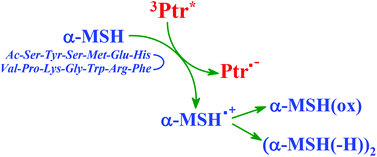Degradation of α-melanocyte-stimulating hormone photosensitized by pterin†
Abstract
Oxidized pterins, efficient photosensitizers under UV-A irradiation, accumulate in the skin of patients suffering from vitiligo, a chronic depigmentation disorder. In this work, we have investigated the ability of pterin (Ptr), the parent compound of oxidized pterins, to photosensitize the oxidation of the peptide α-melanocyte-stimulating hormone (α-MSH), which stimulates the production and release of melanin by melanocytes in skin and hair. Our results showed that Ptr is able to photoinduce the degradation of α-MSH upon UV-A irradiation and that the reaction is initiated by an electron transfer from the peptide to the triplet excited state of Ptr. The photosensitized process produces chemical changes in at least two different amino acid residues: tryptophan and tyrosine (Tyr). It was shown that α-MSH undergoes dimerization and oxidation, the former process taking place after the formation of Tyr radicals. The present findings are analyzed in the context of the general behavior of pterins as photosensitizers and the biological implications are discussed.


 Please wait while we load your content...
Please wait while we load your content...